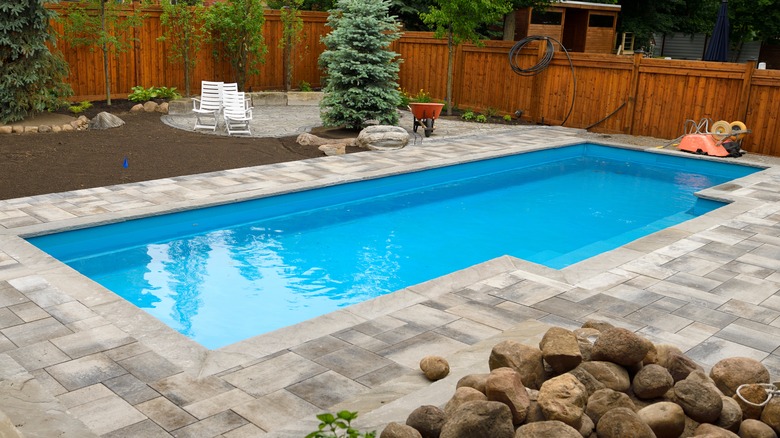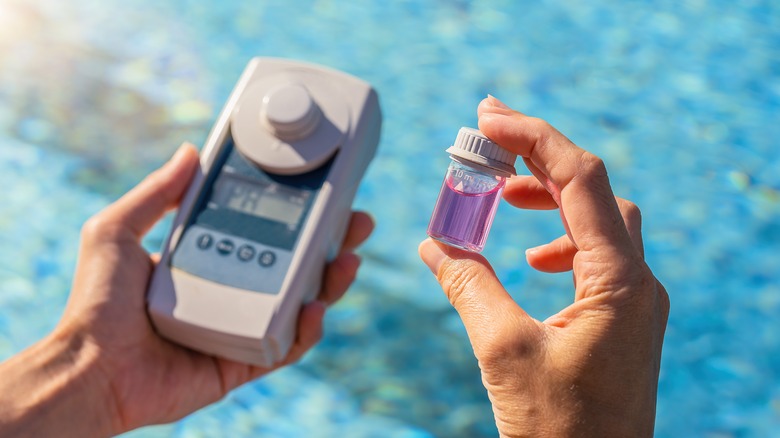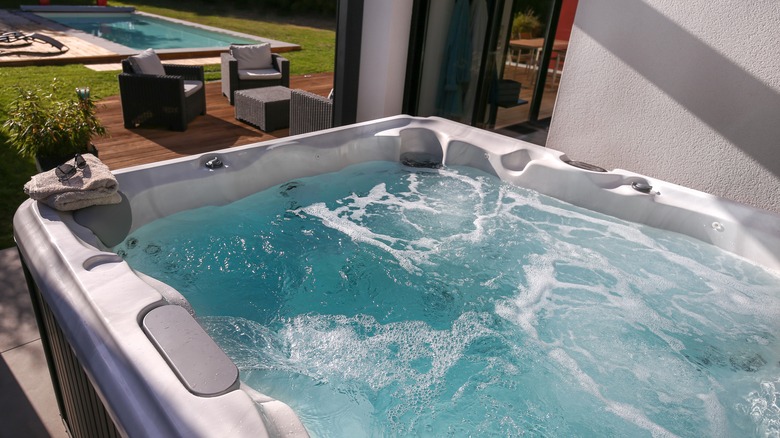The 'Safer' Chlorine Alternative You Should Think Twice About Using In Your Pool
Keeping a pool clean is a lot of work. Even if you use a pool cover to keep out debris, germs and algae in the water itself can put your pool in dire need of a cleaning. Chlorine is the most popular chemical to use; it's effective at keeping the water clear, and it's widely available. Some have turned to bromine, another disinfectant, as a "safer" chlorine alternative, but bromine is expensive, less effective in outdoor pools, and can still irritate skin and eyes.
There are many reasons to look for an alternative to chlorine. "There's a distinct chlorine smell that some find unpleasant, and using chlorine requires careful storage and handling because of its chemical properties," Jimmie Meece, Brand President of America's Swimming Pool Company, exclusively told House Digest. "It can also irritate the eyes and skin, causing chemical injuries, especially if improperly balanced or maintained at high levels."
Meece says bromine "has similar properties to chlorine" and doesn't have as strong of a smell. Plus, it's "less irritating to the skin and eyes." Sounds perfect, right? Not quite. There are caveats to know about bromine before using it as a chlorine substitute.
Bromine isn't necessarily safer
Bromine costs more than chlorine, ASP's Jimmie Meece said, and it's not necessarily safer or healthier, depending on the context. It breaks down more quickly than chlorine in UV rays, so it's not a better choice for outdoor pools that receive sunlight. It may require more frequent checks than chlorine. "Overall, it is a viable alternative to chlorine but is very difficult to stabilize properly," Meece exclusively told House Digest.
What's more, bromine shares some of the same cons as chlorine. While less likely to bother your skin or eyes, it "can still cause irritation if not properly balanced, and it requires regular monitoring to maintain effectiveness," Meece explained. Neither bromine or chlorine are a one-product solution to a clean pool. "Maintaining a proper chemical balance in your pool is what keeps your water safe for swimmers," Meece added. "Bromine, just like chlorine, needs to be used alongside other chemicals."
When and how to use bromine
There are some settings where bromine is a common and effective chlorine alternative. It's popular to use instead of chlorine in hot tubs and spas. "Bromine is more stable at higher temperatures, making it suitable for hot tubs and spas where chlorine might dissolve quickly," Jimmie Meece told House Digest exclusively. The more gentle smell is also appreciated in indoor pool environments, where it lasts longer than outside due to the lack of sun.
Whether you opt for chlorine or bromine for your pool, you'll need other chemicals to balance the pH, alkalinity, and water hardness. "Regular testing and adjustment of these are crucial to prevent algae growth, maintain water clarity, and ensure swimmers' health," Meece said. "Proper filtration and circulation also play significant roles in keeping the pool water clean by removing debris and distributing sanitizer evenly."
Meece recommends carefully following directions and using personal protective equipment when handling pool chemicals. Making a mistake with pool chemicals can be dangerous, so measure carefully, always mix in the right order, and don't hesitate to hire a professional if you're not confident doing it on your own.


